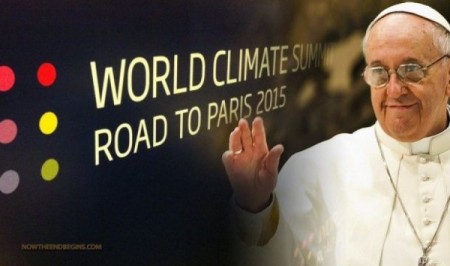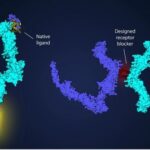June 18, 2015 – Although couched in biblical terms and phrases, the head of the Roman Catholic Church couldn’t have said it better in proclaiming “praise be to you, my Lord, through our Sister, Mother Earth, who sustains and governs us…” He goes on to state “this sister now cries out to us because of the harm we have inflicted on her by our irresponsible use and abuse of the goods with which God has endowed her.” Never in my dreams would I have thought a Pope would give religious character to Mother Earth, almost equal billing with the Catholic God. But in his encyclical on climate change, Pope Francis draws the Gaia metaphor vividly in speaking of our home planet, the only place in our Universe that we currently know of to sustain the rich biodiversity of which we are a part.
In his appeal, Francis makes two declarations. The first:“The urgent challenge to protect our common home includes a concern to bring the whole human family together to seek a sustainable and integral development, for we know that things can change.” And the second: “We need a conversation which includes everyone, since the environmental challenge we are undergoing, and its human roots, concern and affect us all.”
He goes on to outline “the results of the best scientific research available today” covering pollution, climate science, freshwater scarcity, loss of biodiversity, decline in quality of life, profound global inequality, and the weak responses by governments around the world to these crises. He states:
- “It is remarkable how weak international political responses have been. The failure of global summits on the environment make it plain that our politics are subject to technology and finance. There are too many special interests, and economic interests easily end up trumping the common good and manipulating information so that their own plans will not be affected.”
- “Economic powers continue to justify the current global system where priority tends to be given to speculation and the pursuit of financial gain, which fail to take the context into account, let alone the effects on human dignity and the natural environment.”
- “We…note the rise of a false or superficial ecology which bolsters complacency and a cheerful recklessness. As often occurs in periods of deep crisis which require bold decisions, we are tempted to think that what is happening is not entirely clear. Superficially, apart from a few obvious signs of pollution and deterioration, things do not look that serious, and the planet could continue as it is for some time. Such evasiveness serves as a licence to carrying on with our present lifestyles and models of production and consumption. This is the way human beings contrive to feed their self-destructive vices: trying not to see them, trying not to acknowledge them, delaying the important decisions and pretending that nothing will happen.”
The Pope describes the root cause of climate change tracing the history of the Industrial Revolution and our “technoscience” world. He points out that what we humans have created through technology, science and our drive and energy has given us domain over the world, tremendous power that we have exploited negatively as well as positively. He remarks, “there is a tendency to believe that every increase in power means ‘an increase of progress itself.'” And then counters that by stating, “contemporary man has not been trained to use power well.”
And it is what he calls a “one-dimensional paradigm” that rules us today with humanity blindly charging ahead using technology without considering the unintended consequences. That technocratic paradigm often forgets societal and ecological implications. In his words, “neglecting to monitor the harm done to nature and the environmental impact of our decisions is only the most striking sign of a disregard for the message contained in the structures of nature itself.”
Of course as an encyclical this 184-page document makes numerous references to Catholics of the past including popes and saints, and their insights about balance in life and nature. But it is the non-religious sanity expressed here which impresses me, a foresworn atheist.
At times the encyclical strays from its purpose to alert the laity of the Church and the larger population of the planet to the dangers of our response to anthropogenic climate change. These sidetracks on abortion and even genetically modified (GM) foods I found unnecessary because they were off message. But I guess it is hard to put a document of this size together without bringing in some old liturgical themes and a new favorite, GM foods. On that subject, however, the Pope acknowledged that “in some regions their use has brought about economic growth which has helped to resolve problems.” But then he goes on to talk about GM crops causing changes to farming practices, concentrating land in the hands of fewer owners and finally turning to the end result, disenfranchisement and poverty. Of course, the opposite is true with GM food crops improving the overall income of farmers in the poorest countries of the planet and helping to alleviate hunger. See my recent posting on “The GMO Debate” as reference.
But now I digress.
So what can a religious leader accomplish in swaying all of us on the planet to act responsibly in addressing human-caused global warming?
The Pope calls for “enforceable international agreements….transparent political processes…..no concealment of actual environmental impact” on human activity. He cites the validity of public consumer movements as models to apply social pressure to change business-as-usual and government-as-usual so that meaningful change can be brought about. Change in consumerism, change in social responsibility….in a word “the issue of environmental degradation challenges us to examine our lifestyle.”
The Pope also takes a swipe at carbon credits as a solution for rescuing the planet. He questions the validity of credits which he describes as “a new form of speculation which would not help reduce the emission of polluting gases worldwide.” In light of this statement from the Pope, consider Canada’s recent commitment to reduce its overall carbon footprint but with no target reductions for the oil sands. Instead Canada will buy credits on the open market while continuing to mine the sands producing CO2, tailing ponds, and other environmental hazards.
For the Pope it is about humanity losing its compass, losing sight of what is truly important and what is not. At one point he states, ‘the natural environment is a collective good, the patrimony of all humanity and the responsibility of everyone. If we make something our own, it is only to administer it for the good of all. If we do not, we burden our consciences with the weight of having denied the existence of others.”
But he wouldn’t be the leader of the Catholic faith if he didn’t propose spirituality in addressing climate change. He evokes “ecological spirituality” as a governing force going forward and provides numerous examples for those of the faith. The encyclical ends with two prayers one asking us to “protect the world and not prey on it,” and the other “enlighten those who possess power and money that they may avoid the sin of indifference, that they may love the common good.”









